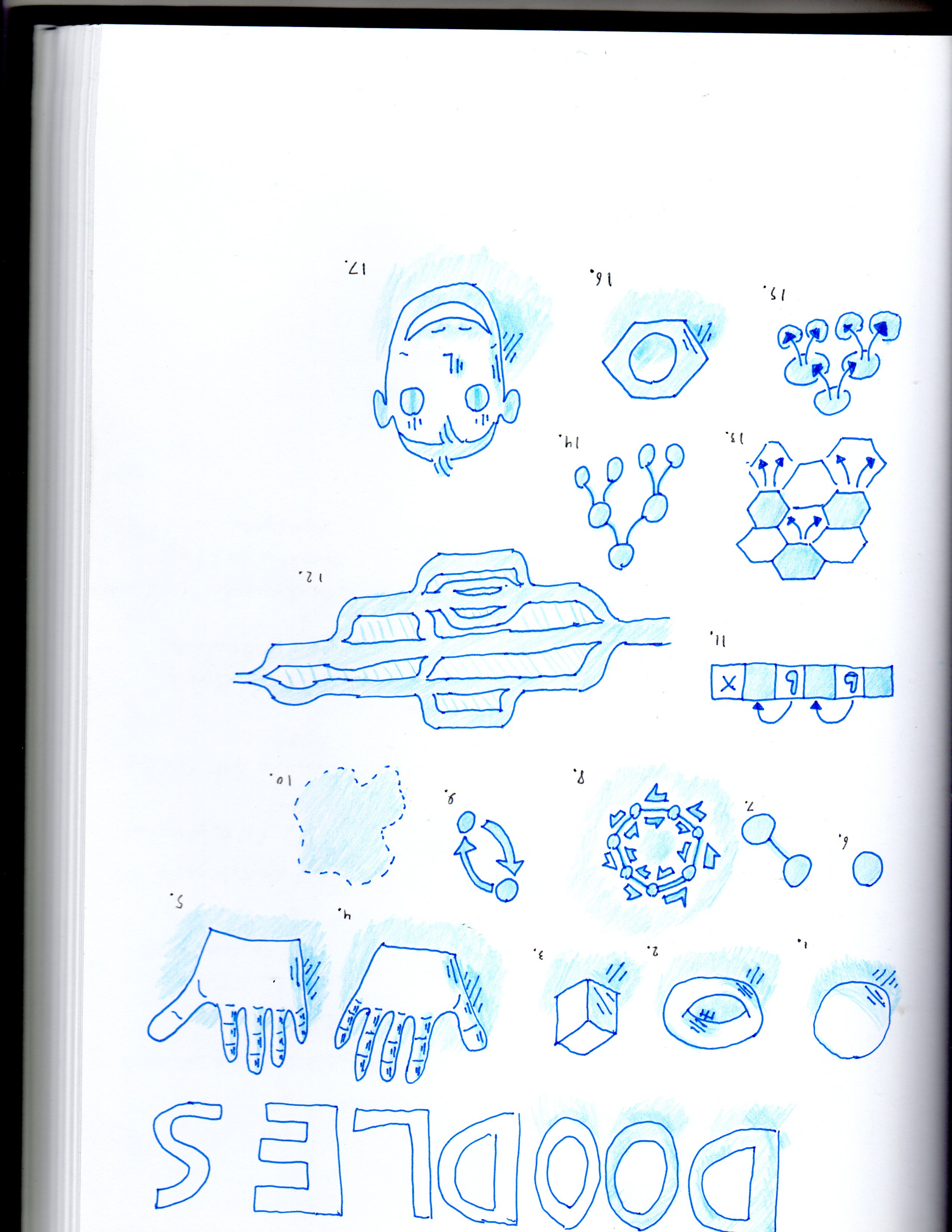
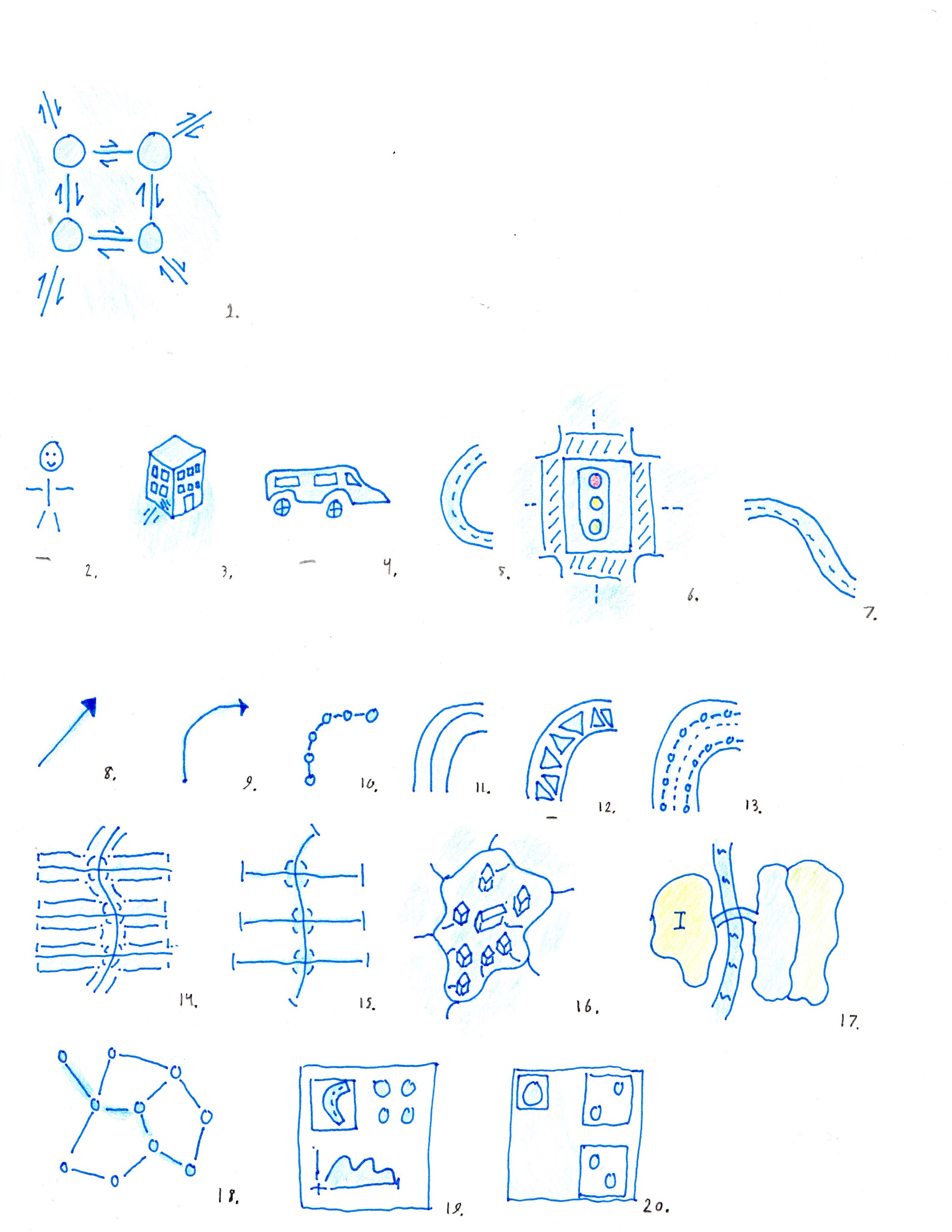
I particularly liked The Miseducation of the Doodle.
Section 6, which discussed shading and shadowing showed me how simple adding depth cues could be. I decided to try it out myself in my sketchbook. I also like the visual alphabet toolbox. For the "Doodle" set below, my roommate like all of my doodles, except for 4, 5, and 12. He did not like 4 and 5, because he thinks that they look too much like apes hands, because their is nothing to orient him to their anthromorphism. He didn't like 12, because it is kind of like a blob, which doesn't necessarily point to a particular shape. I also did not like 12, because I lacked a clear focus and ended up drawing seemingly random paths and filling in everything with blue.
For other set on the right, my roommate did not like 2, 4, and 12, because they didn't have the same inviting shading on the lines, so they were rougher and not as welcoming.
Please click on the following images to enlarge them.


I first saw this video in a class at Carnegie Mellon called the Roots of Rock and Roll. Back then we saw it in the context of how blues, jazz, rock and roll, folk, etc came about through various people influenceing each other. It makes sense to me, because I've had many portions of my life when I've hidden away in an introverted cave and I've found that the more I limit myself from external input, the more my ideas and aspirations are limited. Even when I do something that is idiosyncratic, it is based in real experiences that I have had in my past. As I get older, I know more people who I can directly list as inspirations for projects I would like to do in the future. My family sometimes would ask me whether the things I am doing are new. Sheepishly, I would pretend to myself that they are new, but inside I knew that I was just repeating the work of giants that have come before my time. I would sometimes feel ashamed, because I can't do amazing work, unless I go through the process of remaking awesome things that others have invented before me. To improve my proccess, I would like to incorporate more dedicated external reading time to my life.
This movie was a wild ride. Mister Brainwash seemed to be a somewhat irresponsible person, because he was ignoring his family for the majority of the film, but his wife seemed to be way too understanding. I think that the movie is a tad bit ridiculous, since Thierry just happens to have a cousin who is a street artist, and he just happens to be extremely good at getting people to trust him. Shepard Fairey seems to be a bit too accomodating of Thierry, because Thierry was turrning on lights and climbing around. I found it unrelatable that Thierry desired a sense of danger so much that he would travel with street artists up to roof tops. The final scene when Thierry puts together his own art show was crazy. I can't believe someone could tack together a bunch of art by directing a team of creators and manage to convince a bunch of paying customers to view it. I still don't understand the economics of the Art industry, since people are willing to pay for ramshakle visual objects, but less willing to pay for computer games. I think that for my own work, even if this documentary is a bit contrived, is that I should try to find the audience of people who are willing to pay for my work and put forth a good faith effort to provide the public with the opportunity to pay for it. I also see how sometimes it is more important to just go out and do things, rather than contemplating them too much.
I didn't read the book, but I watched a TED Talk by Austin Kleon. This TED talk didn't seem to provide me with terribly much new insight, beyond the confirmation that ideas have lineages. I also thought that it would be a bit tedious to physically black out an entire newspaper. Yet again, I am thinking that I should incorporate more external feeds of information into my life.
I did some research on the life, work, and proccess of Marcel Duchamp. Evidently he was more influencial that I thought and he pioneered discussion about what constitutes an art object. He famously presented a urinal at an exhibition and entitled it "Fountain". My favorite of Duchamp's work is his Nude paintings that depict figures at diffferent points in time while performing a movement.

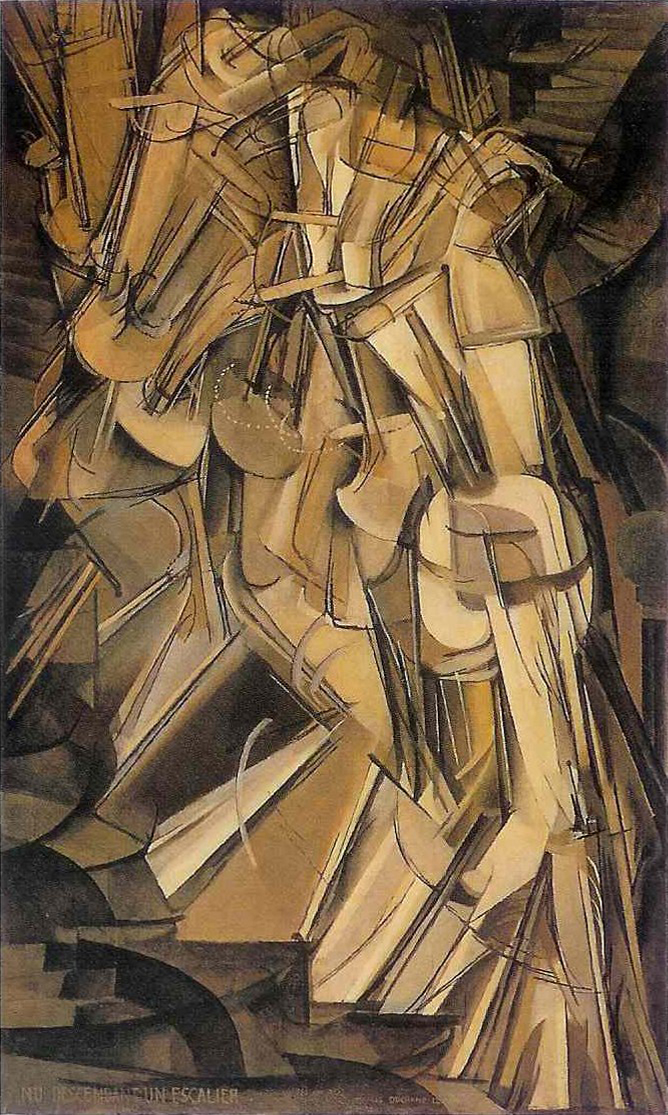
I love the walking nudes, since they present a means of depicting change in time in a static still framed image. It seems that Duchamp was rather intellectually motivated and thought in terms of how creations may provide cerebral benifits, rather than purely visible inputs to human eyeballs. He continued pursuing his childhood interests, such as chess playing throughout his life. I was impressed by how he managed to pay the bills by working as a library, while also therebye finding time to learn about things that interest him. In my life, I would like to learn how to be okay with the learnings I am doing in the present and push off various types of future learnings to the future, without worrying about them. I like that he understood the existance of science as an ideology of consistant understanding between people, and he made a similar leap as I have when he doesn't worry about how his work and actions are interpreted, because truth is constructed as a team exercise between participants. I used to think that Math was truth, but I then realized that math is argument. I've been in the throngs of modernist teachings back in Computer Science School and was in a deep relationship with abstractions, where I saught to abstract myself away and the environment of our lives. At the same time, I desired intimacy, to break through the boundaries of abstraction that seperate us. I feel like Duchamp might have felt similar, where he liked both mathematics and artmaking and had to reconcile influences coming from different parts of his life.
It looks like DJ spooky travels for inspiration and maps his electronics onto his experiences.
The second process seemed more end heavy. The director / Game designer Hideo Kojima was very good at finding possible ways to improve the artistic product, much like some of the highest quality artists that I have known. The first documentary discusses how they brought in foreign composers. They also allowed all of their employees to submit ideas in the idea book, whereas Kojima seemed to be more of a monolithic author while leading MGS 4. It was interesting to see how he justified the late rerecording of voice acting. I was also impressed by how the company employees were able to rationalize their work by thinking about how it affects the players who will consume their products. Ideas were persued when they are technically possible, but also fun. If an idea is not fun, then it is dropped from the game. I'm not sure I would feel good embedded in such a compartmentalized creative process, where people have dedicated roles. I can see the appeal of working with people who are in a similar life situation to yourself. It was moving when they talked about how back in the day, most people who ended up in the games industry were rejected from other media and entertainment industries that they desired to work in, such as the Manga industry, the films industry, etc. I think that number 2 was more about the novelty of incorporating film elements, whereas 4 was more about living up to expectations. Their industriousness inspires me to try to surpass my limits and produce good life work.
Here are some recnt sketches. On the left is a sketch of ideas for my transportation research project and on the right is a sketch for a section in my book about sensors:
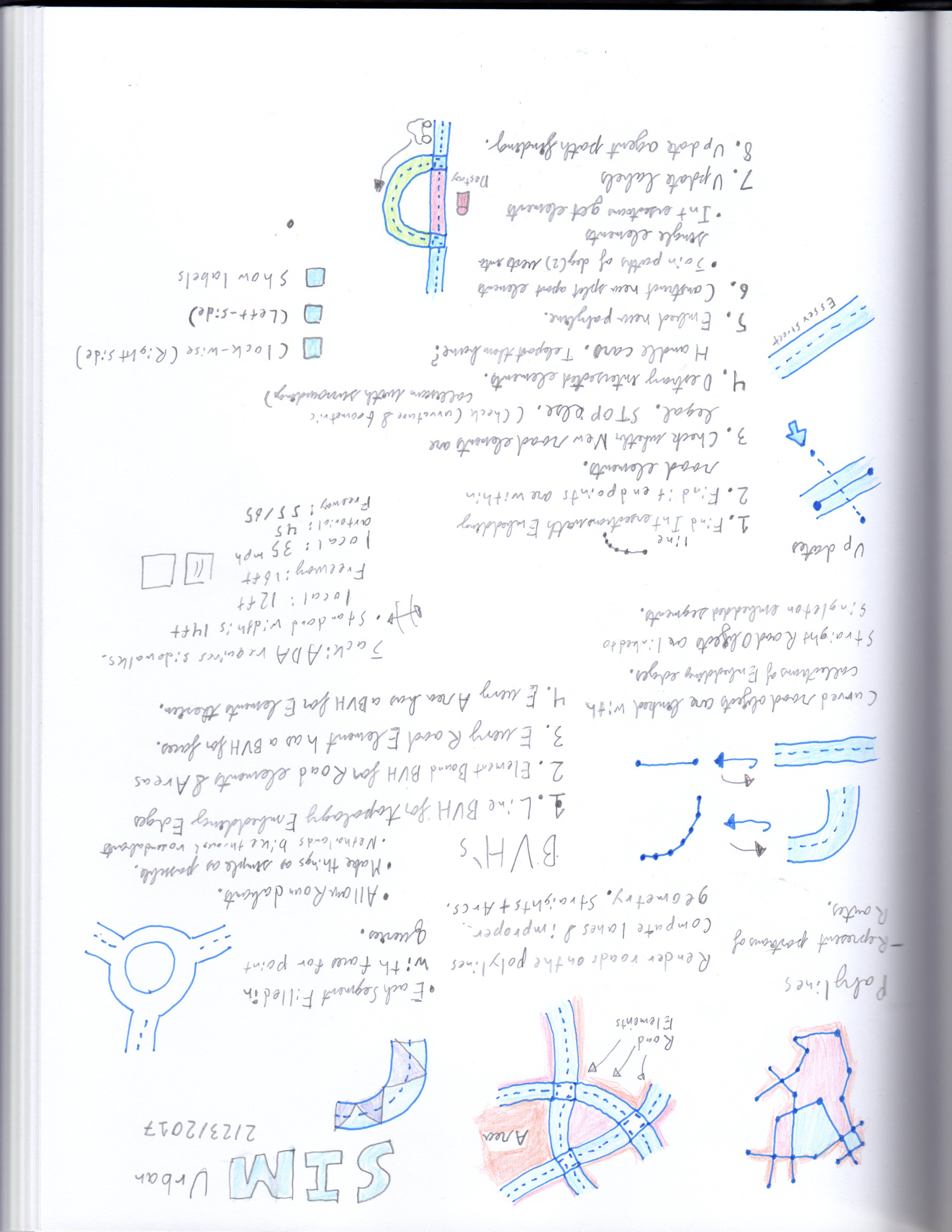
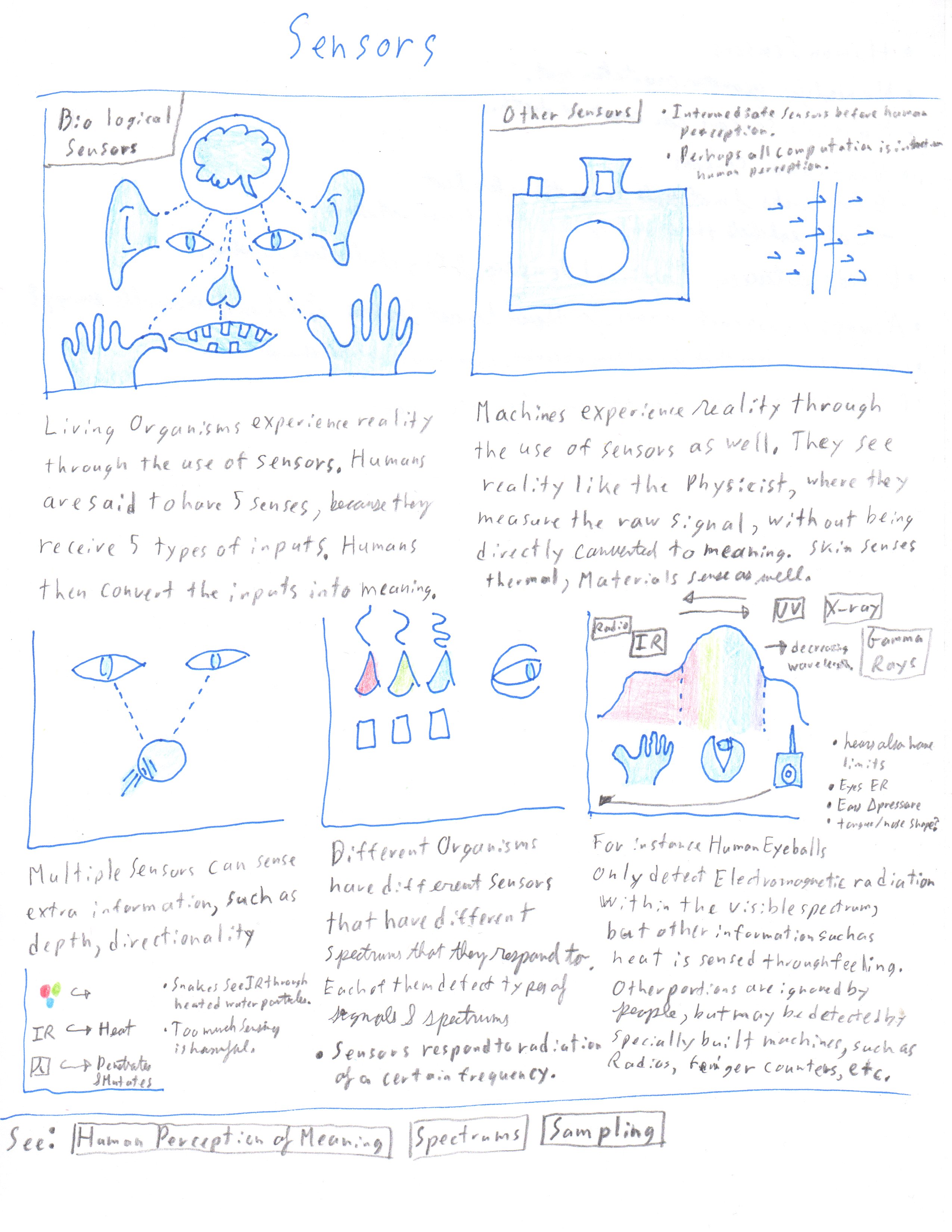
I watched the following video, where Ira Glass recounted his views on storytelling.
I first heard Ira's throughts on the radio back in the day and later watched these videos this semester. Now I have watched them yet again with a more informed perspective. This time around, I was struck by his idea that work wants to be mediocre. Often I come up with ideas, then work on projects that are supposed to express the idea. I get tired of executing and start putting in the simplest effort possible to express the idea. I see work as a constant battle between the desire for completion and my desire to infuse the work with soul. I think that the quality of work is a function of how many descisions were made along the way to chisel the work into an intentional form. After 8 years of on the job training and experience, Ira was still not a master of his artform. Back in the day when I played sports, it seemed like only those players who played in the game were able to continually improve. I've played bassoon in front of audiences for over a decade and there is a large difference between playing for myself in a private room and playing for a room full of strangers. I wonder if this just goes with the territory for creative work, where my effective skill level goes down as my audience is more and more removed from my direct life experiences. We start with noble goals, such as creating interesting compelling messages that are to be sent off into the world, and then we strive to achieve these goals. I'm definitely in that place of mediocre work that Ira discussed, where I can only give up or continue fighting through. I have certain feelings that I'm chasing, but chasing them takes its toll on me. Sometimes I start blaming others or systems for my mediocrity, when it is really just me going through the learning curve. Every time I think that I have arrived, I learn that I'm not quite there yet. Once I have mastered the practices and social practices of one level, I see that my way of being doesn't work at the next level. For instance, it is time to for me to learn how to argue for work to be done by citing the previous work done in the field, rather than by emotionally evoking ideals. Ira's discussion of ancedote and finding momentum through a sequence of actions reminds me of what Scott McCloud said in his book, Understanding Comincs. He showed how story is created between the gaps of two juxtaposed pictures. While the events are discrete, their juxtaposition creates momentum and interest in the audiences head. Ira's mentioning of people who only talk about themselves resonated with me. I've never quite found the balance between depression, introversion, and putting my ideas out there. I often talk about my views and the world inside of my head to other people. Is it ok to tell people about my projects? I'm under the impression that people can't really complement themselves, but rather they need other people to do that. I wonder about the world, but most of the world gets interpretted in some sort of subjective manner inside of my head. I'm not sure how much potential I have to be hospitible to people, because I only really know how to talk to them about ideas and emotions. If they really need money, a roof over their head, or some alcohol to drink, I'm not sure if I really want to be of help. There is no good answer. Assuming I'm an introverted person who likes having some time to myself, I'm not what the proper limits and distribution are between taking care my inside and presumptiously taking care of the outside, when maybe external interest is yet another inside desire.